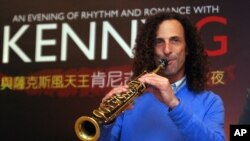U.S. jazz musician Kenny G is playing down his visit to Hong Kong's pro-democracy protests, saying he did not intend to show support for the demonstrators.
The saxophonist on Wednesday stopped by the protest site in the semiautonomous Chinese territory, posing for pictures and flashing a "V" peace symbol while standing next to pro-democracy signs.
Many interpreted the move as a show of support, including China's foreign ministry, which responded by warning foreigners not to get involved with the protests.
In a statement, Kenny G later distanced himself from the protest movement, saying he "[doesn't] really know anything about the situation" and insisting his "impromptu visit to the site was just part of an innocent walk around Hong Kong."
The musician, who is performing a concert this week in the southern Chinese province of Hainan, said via the statement on his Facebook page that he only meant to share his "wish for peace for Hong Kong and for all of China."
He also removed the photos from his Twitter page.
The 58-year-old, whose full name is Kenneth Gorelick, is wildly popular in China, where his song "Going Home" is often played at shops, schools and other events to encourage crowds to leave.
The irony was not lost on demonstrators. Pro-democracy group Global Solidarity HK shared the musician's photo with its more than 3,600 followers on Twitter, adding the comment: "'Going Home?' Not without Civil Nomination."
Following his Facebook statement, many protesters expressed disappointment. One pro-democracy lawmaker, Charles Mok, said on Twitter that the singer was "being used by the Communist Party," and suggesting he "does not deserve to be a citizen of a free country like the U.S."
Beijing state media and officials have repeatedly suggested the West is either indirectly or directly supporting the protest movement, which is pushing for less political influence from Beijing in selecting the territory's leadership.
It is not the first time that China has reacted strongly to foreign performers who make political statements.
In 2008, Icelandic singer Bjork made a pro-Tibet statement during a Shanghai concert, triggering a crackdown on foreign musicians.
China also tightened rules on foreign singers in 2013 after British singer Elton John dedicated a Beijing concert to Chinese dissident artist Ai Weiwei, a prominent critic of China's Communist Party.





